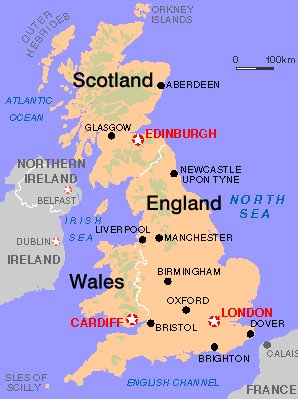About United Kingdom

You will find this section a useful guide about United Kingdom. It explains everything from the basics such as United Kingdom Environment, Culture etc.
Fun Culture In UK
The UK is a cosmopolitan place to live. Many thousands of families from around the world have made the UK their home, creating a richly diverse, open-minded, multicultural society. There are also more than a quarter of a million international students in the UK at a given time.
You have probably come across the UK’s vibrant popular culture through its music, television and films. Now you can find out what it’s like to be a real part of it. This is the home of David Beckham and Kate Winslet.
UK people like to get together and enjoy themselves. Theatres, concerts and art galleries can be found in all large towns and cities; big sports events take place every weekend; pubs and restaurants are everywhere.
Travel In UK
When you come to the UK, you get 3 countries and a province in one: England, Scotland, Wales and the province of Northern Ireland. Each has its own distinctive history, landscape and modern culture. And, because they are all within easy reach of one another, they are easy to explore. The national air, rail, coach and bus networks will get you almost anywhere in the UK, so you will not need a car, as you might in some countries. Discounts or special rates are generally available for students on most forms of transport.
Culture In UK
The United Kingdom is a diverse and multi-ethnic society, where students of all backgrounds are welcome and their involvement in local communities is valued.
The UK is made up of 3 different countries and a province: England, Scotland, Wales and the province of Northern Ireland. These countries all have very different characters and identities.
All this diversity means that, when you come to the UK, you will find it easy to settle in. You will also develop good understanding of different cultures by meeting others from an enormous variety of religious and national backgrounds.
Seasonal Variations In UK
Meals and diet in the UK tend to vary to reflect the changing seasons of the year. For example, in the winter, stews, casseroles and roasts tend to be popular, while, in the summer, salads and lighter meals are eaten regularly. Supermarket chains import many foods, so they are able to stock vegetables, salads and fruits throughout the year.
Airport Security In UK
Security at international airports is now very tight and there will be a number of items that you will not be permitted to carry in your hand luggage such as scissors and knives. Your airline will be able to provide a list of prohibited items.
Flag and Map Of UK
Map of UK

Flag of UK

Banking and Currency In UK
Banking and Finance
Britain is one of the world’s leading financial centers. Banking, Finance, Insurance, and other business services accounted for about 12 percent of Britain’s output in 1996 and more than a million people were employed in this sector.
The Bank of England, chartered in 1694, was nationalized in 1946 and is the only bank that issues banknotes in England and Wales. Several banks in Scotland and Northern Ireland issue currencies in limited amounts. After the Labour government was elected in 1997 the Bank of England was given operational independence in monetary policy. This means it can set interest rates independent of the government in power, much as the Federal Reserve does in the United States. There are more than a dozen major commercial banks in Britain, including Lloyds TSB, Barclays, National Westminster, and HSBC. The postal system, savings banks, and cooperative and building societies also provide some banking services.
Historically, the financial services industry has been based in the City of London in an area called the Square Mile. The City is a small part of the Greater London metropolitan area that surrounds it. Financial services are still concentrated in the City, although several provincial cities have developed their own financial centers. The greatest concentration of foreign banks in the world is found in the City, and the area accounts for 20 percent of total international bank lending. It also has one of the world’s largest insurance markets and is the world’s main center for trading in stock of overseas companies. One of the world’s largest financial derivatives markets is in the City as well. Financial derivatives are contracts to buy or sell, at a future date, financial documents such as stocks and bonds.
The London Stock Exchange, one of the largest exchanges in the world, has always been a focus of international trade. In 1986 it was substantially deregulated, an event known as the Big Bang in financial circles. This led to the rapid expansion of products, markets, and numbers of employees, a movement that slowed in the early 1990s but has since rebounded.
Currency
The pound sterling (£1), consisting of 100 pence, is the basic unit of currency in Britain (£0.69 equal U.S.$1; 1996 average). Before Britain converted its currency to the decimal system between 1968 and 1971, the pound equaled 20 shillings and each shilling was made up of 12 pence. Bookkeeping had to be done using three columns and the decimal system could not be applied.
The currency in the United Kingdom may change in the next few years to the euro, the new unit of currency being established within the European Union. The British government elected not to participate in the first phase of the transition, in which 11 EU members started to use the euro for accounting purposes and electronic fund transfers beginning in January 1999. After 2002, all EU members who join the Economic and Monetary Union (EMU) will use the same currency and their national currencies will cease to be legal tender.
